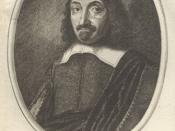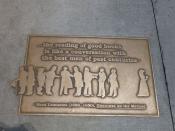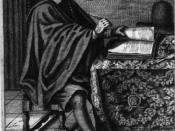Descartes' begins this passage by discussing the experience of walking with a stick, and using that stick to explore the sensations or shapes caused by objects that it touches. This is the beginning of a questioning of what one can know. Descartes recognizes that a normal man with sight might not be able to use the stick with great proficiency, but he then brings a blind man into the discussion and notices that a blind man with a stick almost seems to see with his hands. He calls that stick an "organ" or a "sixth sense" that the blind man seems to possess. Descartes then goes on to call into question one's ability to fully understand the things which our eyes see. In this discussion of optics, Descartes draws a comparison between a blind man's abilities to understand the shape and sensations of objects, and our ability to understand an object's color with our sight.
This raises the question of our senses' ability to interpret the world around us with accuracy.
Descartes notices that a blind man seems to be able to understand the sensations or shapes of an object with a stick. He claims that a person without "long practice with it," might have difficulty feeling the objects out correctly. However, a blind man with much practice can almost experience the world through that stick, because he has adapted to the point where that stick almost serves as his eyes. It seems to Descartes that the stick is "some sixth sense given to [him] in place of sight." Descartes then draws a comparison between the blind man with a stick feeling an object and a person viewing an object through their eyes, particularly their ability to see color. Descartes first states that from this observation of the blind...


